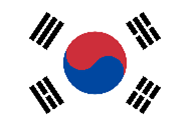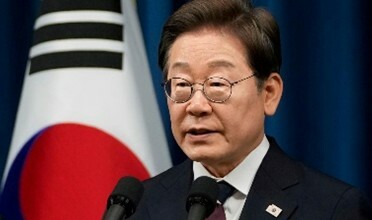The south korean paradox
South Korea boasts a notably high-performing education system, renowned for its academic rigor and excellence. South Korean women, in particular, stand out: they now outperform their male peers in higher education. Indeed, 77% of women aged 25–34 hold a tertiary degree, compared with 63% of men in the same age group. These figures are well above the OECD average of 52% for women and 39% for men.
in higher education. Indeed, 77% of women aged 25–34 hold a tertiary degree, compared with 63% of men in the same age group. These figures are well above the OECD average of 52% for women and 39% for men.
However, this academic success is not fully reflected in the labour market. While 83% of women with higher education are employed across the OECD, only 69% are employed in South Korea. The gap widens even more at leadership levels: despite high qualifications, Korean women remain significantly underrepresented in senior management. According to the IMF, they account for only 15% of senior executives in South Korea, compared to an OECD average of 34%.
This paradox highlights a stark imbalance between educational performance and labour market reality. It exposes structural and cultural barriers that hinder gender equality. Despite some progress, professional inclusion of women remains a major challenge for South Korea, in terms of both equity and economic efficiency.
Persistent inequalities in the workplace
The gender pay gap in South Korea is the highest in the OECD, although it has declined from 37% in 2015 to 31% in 2022,still stark compared to the OECD average of 12%. There is also a pronounced “dual labour market” affecting women: many occupy temporary, part-time, or other irregular jobs with low pay and limited career progression opportunities. Women who leave the labour force during the early years of motherhood often re-enter through precarious contracts. Over 40% of South Korean women take an extended career break after marriage or childbirth, and those who remain in the workforce often struggle to advance. Seniority-based promotion systems further penalise mothers who take time off.
Discrimination in hiring and promotion persists: highly educated women are frequently excluded from strategic sectors and leadership roles. The glass ceiling remains very real, with gender bias blocking access to senior positions, especially in finance, engineering, and high-tech.
Moreover, the rigidity of corporate culture and long working hours, the longest in the OECD, pose significant barriers to women’s participation. Long days, inflexible schedules, and limited telecommuting options make it extremely hard to balance career and family responsibilities. These conditions are poorly aligned with family life, perpetuating long-term gender inequality in South Korea’s labour market..
A society weighted by tradition
In South Korea, traditional cultural norms and expectations about family roles often impede women’s careers. For example, births outside marriage remain exceedingly rare, accounting for less than 5% of births compared to over 40% across OECD countries. South Korea’s traditional values stem from a strong Confucian heritage. Much of society remains committed to these values, including the duty to care for elderly parents, the symbolic importance of university education, and women’s roles as homemakers. In Confucian beliefs, a woman’s chief responsibility lies with her family, meaning she bears most of the burden for child-rearing. In some ways, South Korea’s younger generation is showing disenchantment with this value system by choosing not to have children.
Disastrous consequences for the country
South Korea records the lowest fertility rate in the world, at just 0.75 children per woman in 2024. This alarming trend is accompanied by a rapidly aging population, a direct result of plummeting birthrates and rising marriage age. The working-age population has already begun to decline, threatening the sustainability of the pension system, shrinking the tax base, and weighing heavily on public finances over coming decades.
Socio-economic factors are central to this demographic crisis: high housing costs, heavy expenses associated with child-rearing, a shortage of affordable childcare, and weak support for working parents have made marriage and parenthood less appealing to younger generations. Compounding this is a deeply ingrained culture of overwork: South Korea ranks among the OECD nations with the longest working hours, undermining work-life balance especially for women.
A deeper shift in social norms is underway: many young people, especially women, are increasingly rejecting the traditional family model and prioritizing independence and personal growth over marriage and motherhood. This shift is reinforcing the low birthrate trend.
Finally, these demographic dynamics are having territorial impacts: in some rural areas, population decline is already leading to school closures, weakening local economic activity, and progressive social desertification.
Public policy and initiatives
The South Korean government has introduced numerous policies to reduce the barriers women face in the workplace, aiming to boost both economic growth and fertility. In 2020, it passed legislation to increase gender diversity on corporate boards. The law prohibits publicly listed companies with over 2tn won (approx. €1.5bn) in assets from having boards composed entirely of one gender. After a two-year transition period, it took effect on 5 August 2022. However, it sets no mandatory gender quotas nor penalties for non-compliance, limiting its impact. Since its adoption, women’s representation on the boards of the 100 largest South Korean conglomerates has risen from 3.5% in 2019 to 6% in 2023, an improvement, but one that still falls short of international standards. More ambitious measures are needed to achieve genuine gender parity in corporate governance.
Early in 2024, the government launched complementary initiatives such as expanded parental leaves, improved childcare services, and promotion of flexible work to support women’s employment. Measures include a proposed month-long paid paternity leave and an increase of 600,000 won (approx. €410) to monthly maternity benefits. These policies appear to be yielding results, with a modest uptick in births in 2024 and early 2025. Nevertheless, fertility remains a pressing challenge for South Korean society, requiring sustained and strengthened effort.
Corporate responses
Major South Korean conglomerates have also embraced the challenges of gender inequality and declining birthrates.
 Samsung, with more than 125,000 employees in South Korea, is among the country’s largest firms. In 1997, it took a landmark step by eliminating gender discrimination in its hiring practices. Since then, Samsung has launched various programs to boost female representation especially in leadership roles. Despite this, women made up only 7.3% of senior executives in 2023, up from 3.8% in 2013. The company aims to double that share by 2030. Reducing the gender pay gap is another key commitment. In 2023, the overall gender pay gap at Samsung was 24.2%, still high, though below the national gap of 31% in 2022.
Samsung, with more than 125,000 employees in South Korea, is among the country’s largest firms. In 1997, it took a landmark step by eliminating gender discrimination in its hiring practices. Since then, Samsung has launched various programs to boost female representation especially in leadership roles. Despite this, women made up only 7.3% of senior executives in 2023, up from 3.8% in 2013. The company aims to double that share by 2030. Reducing the gender pay gap is another key commitment. In 2023, the overall gender pay gap at Samsung was 24.2%, still high, though below the national gap of 31% in 2022.
 KB Financial Group has also made strides in managing ESG issues and promoting diversity. Listed in the Bloomberg Gender-Equality Index since 2019, the bank has pursued a strategy to boost female representation in management via dedicated training. It supports mothers through enhanced leave policies, childcare financial aid, and flexible working conditions. For the first time, KB Financial appointed a woman as board chair, and women now hold 42% of board seats, a notably high figure in South Korea.
KB Financial Group has also made strides in managing ESG issues and promoting diversity. Listed in the Bloomberg Gender-Equality Index since 2019, the bank has pursued a strategy to boost female representation in management via dedicated training. It supports mothers through enhanced leave policies, childcare financial aid, and flexible working conditions. For the first time, KB Financial appointed a woman as board chair, and women now hold 42% of board seats, a notably high figure in South Korea.

SK Hynix, the semiconductor giant, has implemented several ambitious measures to tackle low birthrates and support working parents. They cover full reimbursement of fertility treatments and five days of paid leave for employees undergoing treatment. Following the birth of a child, SK Hynix offers a tiered bonus—from 300,000 won for the first child to up to 1M won for the third. On-site daycare, three-month leave when children enter primary school, flexible schedules, a monthly “Happy Friday” paid rest day, and potential permanent telecommuting arrangements all help support family life.
Future outlook and key challenges
Achieving sustained progress in women’s workforce participation in South Korea requires bold economic and social reforms. We believe only a joint effort by public authorities and private employers can ensure success. Government must strengthen parental support policies, enhance childcare infrastructure, provide tax incentives for diversity, and enforce stronger legal protections against discrimination. At the corporate level, HR strategies should promote equitable hiring, merit-based promotion systems, flexible work, and pay transparency. Creating a supportive environment for work-life balance and recognizing women’s potential at all levels can drive more inclusive and sustainable growth.
 The election of Lee Jae-myung on 3 June offers hope of ending the political crisis triggered last December by President Yoon’s martial law declaration. His ascension is seen as an opportunity to accelerate governance reforms, building on the "Value‑Up" program launched in early 2024.
The election of Lee Jae-myung on 3 June offers hope of ending the political crisis triggered last December by President Yoon’s martial law declaration. His ascension is seen as an opportunity to accelerate governance reforms, building on the "Value‑Up" program launched in early 2024.
With a base of over 15M retail investors, about 30% of the population, capital market reform has re-emerged as a political priority. Facing historically low valuations (the price-to-book ratio was 0.84× in 2023), President Lee has made corporate governance a central aim. Backed by a majority party, he proposes unprecedented measures, including an explicit fiduciary duty to shareholders, with the goal of lifting the KOSPI to 5,000 points (it currently stands at 2,950). Gender equality issues received little attention during the campaign, but we remain confident that the new administration can push for inclusive reforms. Greater female participation would expand the talent pool, improve labour market efficiency, and strengthen long-term growth potential.
From an investor perspective, this positive dynamic, underpinned by governance reform, corporate transparency, and rising social awareness, enhances South Korea’s investment appeal. If these ambitions materialize, South Korea could emerge as a higher-performing market aligned with international ESG standards. As of today, GemEquity allocates 11% of its assets to South Korea, through investments in companies such as SK Hynix (6.5%), KB Financial, Hyundai Motor, KTCorp and Samsung Electronics.
